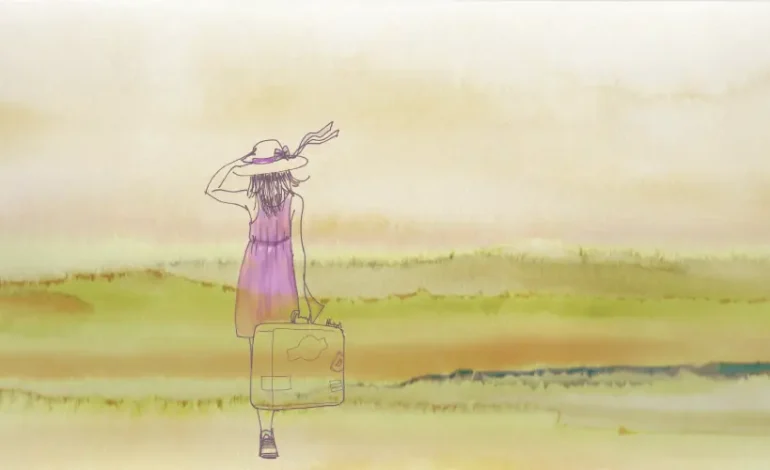The Scents of Home

“Where are you from?”
I always envied those who could answer this simple question by naming the country that is stated on their passport, or the place where they grew up. For me, it always entails a complicated, awkward explanation of how I was born in one city and then moved to another four years later, and then another, and yet another – by the time I’d reach my sixth hometown over the span of twenty years (and that only encompasses the first half of my life’s journey), the person across from me usually regrets having asked the question in the first place.
***
Every city or town I have lived in evokes a kaleidoscope of memories, and they are all accompanied by different scents. My memories of early childhood, which were spent in Tokyo, are fuddled, but some are still strongly imprinted in my mind: our housing area in Senzoku-Ike, situated near a lake where we’d rent rowing boats in summer, the kiddie pool in our community garden and the strange tale of our neighbor who, when he first arrived in Japan, accidentally bought dog food for consumption because he couldn’t speak or understand Japanese. Until today, I am rather unsure if this was a true story or if he was just pulling my leg.
Once a week, usually in the early evening, a white van would stop in front of the main gate of our housing complex, a bakery on wheels. As soon as I entered the van, I felt like stepping into a magical world of bread and pastries. Soft and calming instrumental music was playing over the speakers, and I stood in front of the shelves, breathing in the scent of freshly baked bread and other mouthwatering delicacies, some filled with custard cream, others with red bean paste or green matcha.
“What would you like to have?”
Besides stocking up on bread for the rest of the week, our mother always let my sister and me pick something for ourselves, and I’d point at dorayaki pancakes or sponge cakes with my chubby little fingers, impatiently waiting for the vendor to put my treasure in a little plastic bag and present it to me with a big smile on his face.
***
I spent my elementary school years in a small German town, where our house was situated near a farm. Often perceived as a nuisance by others, the farm’s strong odor never bothered me. Instead, I hung around the paddock for many hours, waiting for the horses to be brought out to graze. There were two mares living on the farm, Schwalbe, which is the German word for a swallow, and Scarlett. Schwalbe was a true darling, meek and gentle, but Scarlett could be quite petulant—I imagine she was named after Scarlett O’Hara, the proud and tenacious heroine of Margaret Mitchell’s Gone with the Wind. I was drawn to Scarlett–both the fictional character and the horse, to be honest – and often observed the spirited animal from a distance, wondering if I was ever going to be able to touch her.
On some days, the horses were brought to another paddock, only a few blocks away from their actual home. I’d go visit them after school, sometimes bringing apples, carrots or sugar cubes for bait. Schwalbe always happily accepted my treats, but Scarlett couldn’t be bothered to even approach me. After a while, however, she seemed to get used to my visits, and one day she pulled her lip corners when she saw me, as if she was smiling. On that day, I had come with empty hands and quickly walked over to the neighboring fields, stealing sugar beets from the ground to entice Scarlett. Sure enough, she slowly trotted towards me. I put the sugar beets on the ground and waited for her to come closer.
When we were just separated by the wooden paddock fence, I noticed that her ears were sticking up and pointing at me, and I put my hand forward, so Scarlett could smell me. At the first touch of her nose, ever so lightly, I knew we’d become friends. Emboldened by Scarlett’s friendly greeting, I began to scratch her neck and ears and eventually gave her the sugar beets. We were close enough to take in each other’s scents: I wonder how a little human being like myself smelled like to a horse like Scarlett – perhaps she caught a whiff of my shampoo, or the laundry detergent my mother used. Scarlett herself radiated the most pleasant smell, an earthy, nature-evoking fragrance, tinged with a small hint of residual sweat. When she was sold a few months later, I missed her terribly.
Also read: My Backpacking Mama’s South America Adventure
***
I first fully realized that I’m a brown-skinned girl with an Indonesian mother and a German father in the small town we moved to next. Suddenly, I noticed occasional strange looks and raised eyebrows, and that the cashier of a drug store followed me through the aisles, just making sure I wasn’t slipping anything into my pockets.
One time, I attended a town fair together with my parents. We walked back through the cobblestone roads to where we had parked our car. I reached the parking lot first because my parents were still window-shopping and since I didn’t have the key, I waited patiently next to the passenger door. Out of the corner of my eye, I saw a middle-aged man approaching, wavering from side to side—he obviously had too much to drink. When he saw me standing next to our car, he suddenly fastened his pace and walked right up to me, grabbing me by my wrist and shouting: “This foreign brat wants to steal a car!”
I wriggled myself out of his tight grip and ran into the direction I suspected my parents to be. They were just around the corner, and the man eventually walked off. With my heart pounding, I urged my parents to hurry up but didn’t tell them about the incident. Only later I understood why I had kept silent: I felt ashamed. Perhaps, if I had to pinpoint the beginning of my internal struggle with questions of home, identity and roots, this would be it: the moment I was accused of being a car thief, simply because I looked different than the other kids in this town.
I also have fond memories of those years: friendships that have lasted until this day; the discovery of two lifelong passions, writing and football; our house, where I can still see my dad in our garden on the weekends, casually dressed, mowing the lawn. It was never his favorite chore around the house, but rather something he had to do, yet the smell of freshly mown grass always catapults me to my years as a young teenager – it’s the scent of summer, the harbinger of adventure, the promise of freedom and the naïve hope for fulfillment, love and joy, that can be such a strong presence in life during one’s youth but slowly and painfully fades away over the years.
***
The low humming of the air conditioner, the herbal fragrance of lavender incense sticks, walls plastered with posters of Lenny Kravitz and Pearl Jam—my bedroom was my temple. Fate had brought me back to Tokyo—or, more accurately, my father’s job had—and into the arms of a boy, a boy who dressed in baggy pants, oversized t-shirts and checkered vans, who listened to hip hop music, and who carried around his skateboard like a second skin. But most of all, he was the first boy I ever loved, who had ever loved me and had said the actual words to me, “I love you,” and I thought my heart would explode.
He was my classmate. Insignificant chitchat would turn into witty banter, acquaintance into friendship, and later into love. The kind of love that you only feel once, that first love that makes you drift away in the classroom, feel a thousand butterflies flutter in your stomach, lie awake at night and think about the gentle touching of hands and stolen kisses during recess. He adored me as I adored him; he showed genuine interest in my Indonesian roots, let me share stories about family gatherings where I discovered that I had yet another cousin, uncle and aunty, and listened with me to Indonesian songs without understanding a single word. I cheered for him when he managed a slam-dunk on the basketball court and hugged him when he got into a fight with his dad.
Also read: How I Pushed Away My Mother Tongue in Favor of English – And Regret It
On weekends, he’d come over to my house; sometimes, we watched a movie, but more often than not, we were content hanging out in my bedroom. We could talk for hours or just sat next to each other in complete silence, smiling sheepishly at one another. Sometimes, we’d lie side by side on my bed, drowsy and only half awake, and my head fit perfectly into the hollow between his head and shoulder. My nose would be pressed up against his neck, so I could smell the cologne he always wore, just a few drops in the morning, he said, a refreshing and woody scent with a crisp trail. These innocent and intimate moments became eternity, and for a little while, we were invincible.
***
Every time I arrive at Soekarno-Hatta airport in Jakarta, the only city I used to call home for over a decade and therefore perhaps the only one worthy of being referred to as such, I follow the same routine: when the plane touches down on the runway, docks at the gate and I finally step onto the jet bridge, the first thing I do is take a deep breath and wait for that familiar scent to waft across, until it enters my nostrils and slowly fills up my whole body.
Jakarta smells of tropical heat, body sweat, clove cigarettes and a myriad of spices. Others have pointed out to me that nothing about the city’s scent is as wonderfully unique as I make it out to be. They say it reeks of sewage, gasoline and desperation. But to me, it smells like home.
Jakarta’s scent brings back a host of images to my inner eye, precious moments that I look back on with love and melancholy: the many hours spent in the car with my cousins, aimlessly driving around the city at night, while listening to Indonesian music; evenings filled with laughter and tipsy imprudence at my favorite bar, together with my sister and our friends; my grandmother sitting on the terrace, reading the newspaper and solving crossword puzzles; a six-months-old puppy wagging his tail, anxiously waiting for me to take him home; a busy newsroom, alive with the buzz of reporters and editors chasing the latest stories; my mother wearing batik, watering the colorful orchids in our small back garden; the sate ayam vendor roaming our neighborhood, steadily pushing forward his cart; the street children at a shopping mall in Central Jakarta, and me boldly searching my pockets for candy and coins because they knew I’d never meet them empty-handed.
***
My parents’ house in Berlin is a mirror of my own life’s journey, starting from my mother’s collection of traditional Japanese kokeshi dolls and antique tansu chests to the Indonesian artwork adorning the living room walls.
Sometimes, when I stop by after work or for a visit on the weekends, my mother is standing in the kitchen, preparing dinner, and the aroma of freshly cooked rendang in coconut milk wafts through the air. If the weather permits it, I usually spend some time in my parents’ garden.
After my father retired from work and they moved to Berlin, he told my mother that she could design the garden to her taste, and it has become the replica of a Japanese zen garden, with a cherry blossom tree, stone lanterns and gravel. Here, in this garden, I don’t catch the scent of freshly mown grass anymore. Still, it feels like home.






















